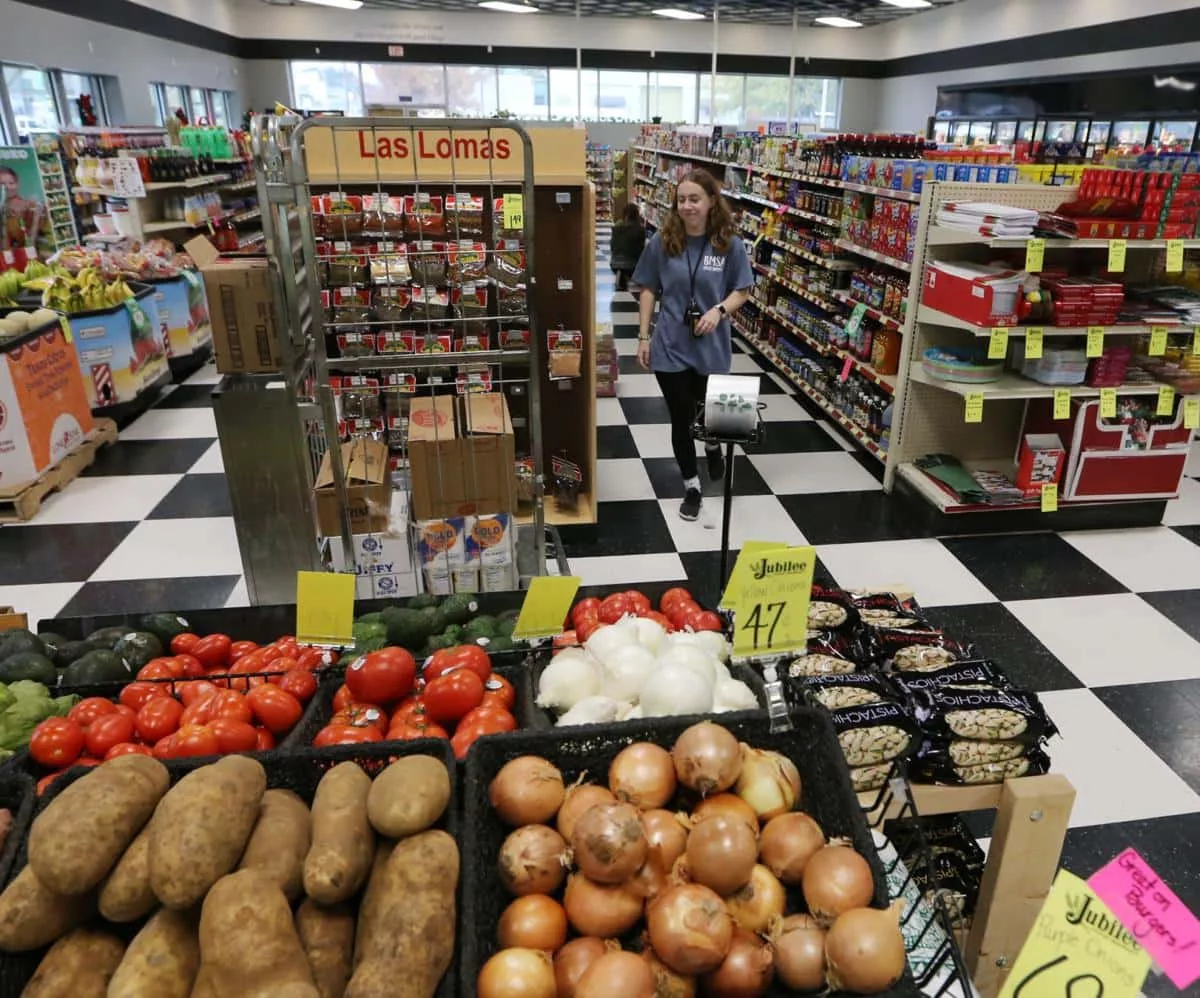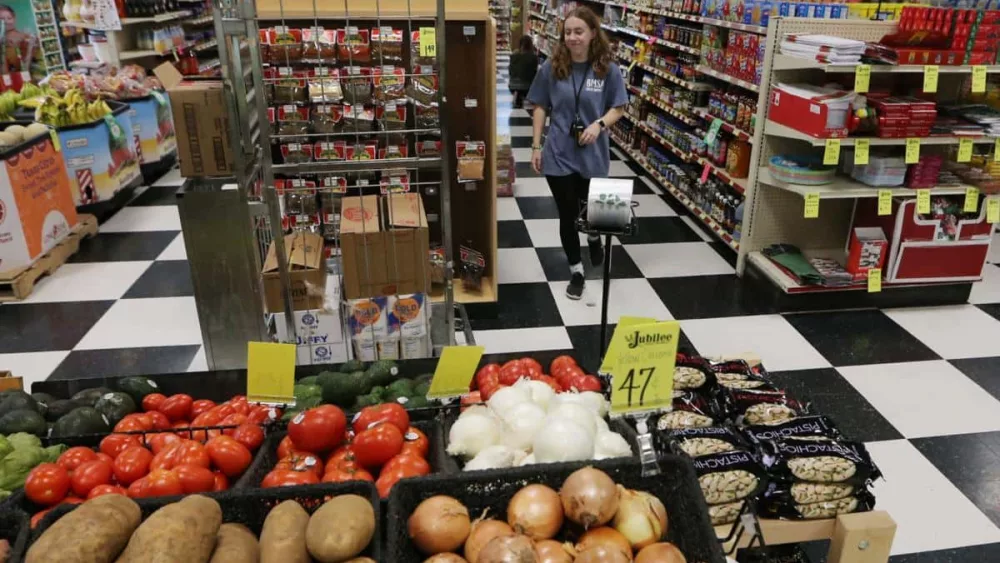
Jubilee Food Market has grown into its role as the only grocery store in a longstanding North Waco food desert, and other Texas cities have taken notice.
The nonprofit market’s parking lot was full of volunteers, supporters, families and their children Thursday night to mark the occasion. Mission Waco founder Jimmy Dorrell weaved through the crowd, setting up games and greeting guests who had been there when Mission Waco launched the grocery store in 2016.
Dorrell said the $900,000 undertaking was fun, but frightening.
“We’re growing up, and we feel like we’re getting our heads around this,” Dorrell said.
The store at 15th Street and Colcord Avenue, near other Mission Waco ventures, is operated by a combination of paid staff and volunteers, filling a neighborhood need for affordable, high quality food. Dorrell said the store would never have worked without the support of the community, meaning the neighbors within walking distance, the middle-class shoppers who come to Jubilee by choice and the local churches that source food through Jubilee.
“It’s community-based, and the neighborhood has owned it,” Dorrell said. “Every month, we see more and more. Every month, more and more people come to see if it’ll work for them.”
He said over the years, the organization has learned more about catering to neighborhood tastes. Black and Hispanic customers requested items like oxtail and fresh cactus, and white customers overwhelmingly requested Blue Bell ice cream.
“As we became more customized to the neighborhood needs, more and more people came,” Dorrell said. “We’re a very diverse neighborhood.”
According to the United States Department of Agriculture, about 13.5 million people live in food deserts, low-income census track areas with limited access to supermarkets or grocery stores.
Commercial grocery stores operate with a very narrow profit margin and often will not come to low-income neighborhoods. Dorrell said the store still has not broken even, but gets closer every year as more customers come.
“It ebbs and flows,” Dorrell said. “We’ve got from about $28,000 a month to $52,000 a month. We think we need about $60,000 a month net (revenue), so we’re not far away. We hope this next year we’ll break even.”
He said if Jubilee passes the $60,000 mark, profits will go back into the store and go toward other programs like health fairs.
“We still have education to do, but so far it has been fun,” Dorrell said. “I’ve had people come down the aisle and say ‘Thank you so much,’ and give me a hug. That’s the way the neighborhood is, but that’s also how we know it’s working.”
Juana Cancho, who has lived in the area for 20 years, said she is able to walk to Jubilee from her house. Through a translator, she said that before the market opened she shopped primarily at the H-E-B on 19th Street, a 45-minute walk from Jubilee.
“It’s more convenient here,” Cancho said. “Because I don’t drive, I would always have to ask somebody to take me there.”
She said she is mostly content with the store’s selection, but there are a handful of things she needs that she has to buy elsewhere.
In its short run, the market has caught the attention of city officials and nonprofits working to eliminate food deserts in their own cities. Houston City Councilman Jerry Davis, whose district contains multiple food deserts, visited the market in its first year of operation.
“The crucial and critical part is when you get community buy-in to what you’re doing, which they’ve done, and you should have continued success,” Davis said.
He said he is working with Houston nonprofit WAIIT, which stands for We Are In It Together, to start a beekeeping operation and may start an aquaponic farming operation like the one at Urban Reap, the agriculture project adjacent to Jubilee. He said if everything goes as planned, the nonprofit would be able to partner with the city and open a nonprofit grocery store stocked with locally grown produce.
“I believe if we were able to do this and partner with this nonprofit it would be the first of many throughout the city of Houston,” Davis said.
Residents in his district are often forced to shop at stores with lower quality produce or travel 5 to 7 miles from home, he said.
“It’s nothing against the grocery stores, but we’re tired of them giving us what they want but then telling us ‘no,’ ” Davis said. “We went to Kroger, Walmart, H-E-B, Aldi, you name it, and we tried to bring them in with subsidies and things like that, and it was ‘no.’ ”
That ongoing struggle to bring a grocery store to a low-income neighborhood is one Anga Sanders is all too familiar with. Sanders is the founder and director of Feed Oak Cliff, a nonprofit focused on bringing healthy food and health education to southern Dallas, where grocery stores have been scarce for years.
She said Jubilee’s model was radically different from anything she had seen.
“It has been a transformational model for that community, and we’re looking to do the same thing here,” Sanders said. “It’s become sort of famous in Dallas. If you talk to anybody who is even thinking about starting a market, the first thing out of their mouth is ‘we need to go to Jubiliee.’”
She said after years of the city of Dallas attempting to recruit grocery stores to the area, including an unsuccessful $3 million incentive offered to any and all takers in 2016, Jubilee’s success has changed the conversation.
“They did it in a place where it needed to be, but there’s lot of places where things need to be and aren’t,” Sanders said. “The stars aligned for them. Things happened that just seemed almost uncanny.”
Sanders said now the possibility of running a successful nonprofit grocery seems within reach.
“Dallas is not Waco in any way, shape or form,” Sanders said. “It’s a different hill to climb, but at least I saw the possibility.”
— WACOTRIB
— WACOTRIB





